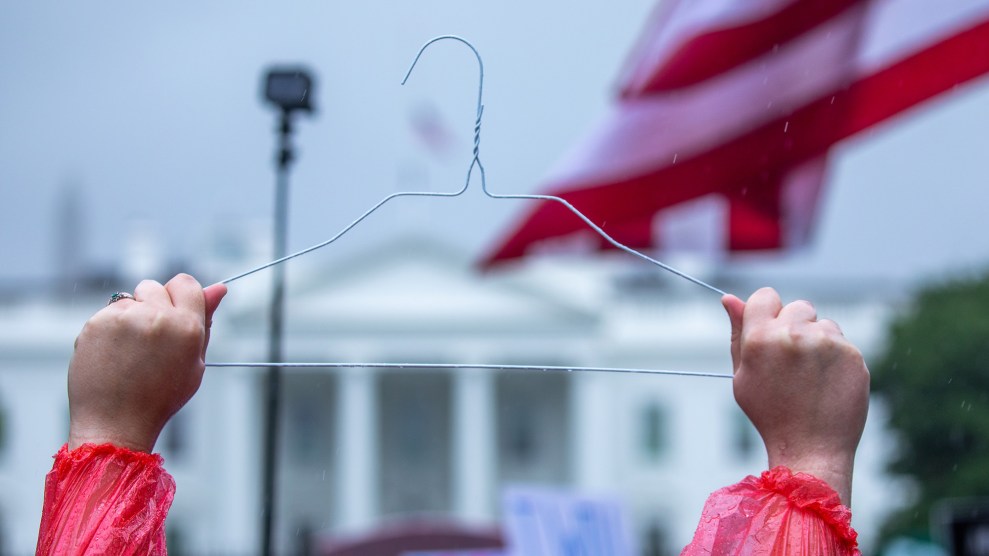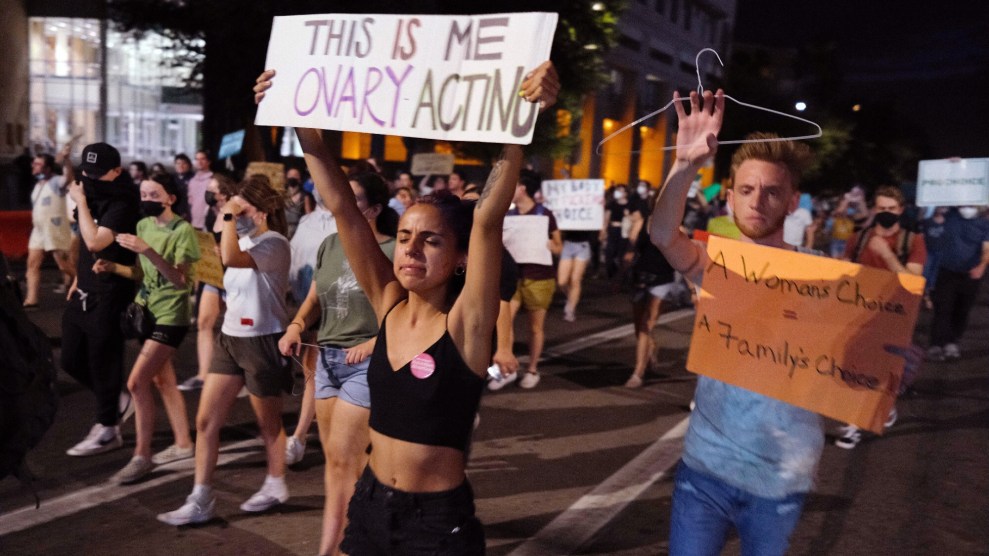
Repro-Rights supporters demonstrate at the Federal Courthouse in Tucson in 2022.Christopher Brown/ZUMA
On Tuesday, the Arizona Supreme Court upheld a 1864 abortion ban, making nearly all abortions in the state illegal and potentially criminalizing healthcare providers with up to five years in prison. The justices said that after the fall of Roe a Civil War-era law, that existed before Arizona became a state, took precedence over a 15-week ban passed in 2022. In a 4–2 decision, the court ruled that the law is “now enforceable.” The ban goes into effect in 14 days.
Arizona now joins 15 other states that ban abortion in nearly all cases with little to no exceptions.
But it’s unclear how—or if—this law will be enforced across Arizona.
In 2023, Arizona Gov. Katie Hobbs, a Democrat, issued an executive order granting state Attorney General Kris Mayes the sole power to handle abortion prosecutions under state laws. Soon after, Mayes said she would not prosecute any providers under the state’s criminal ban. She emphasized that again today after the ruling.
The “decision to reimpose a law from a time when Arizona wasn’t a state, the Civil War was raging, and women couldn’t even vote will go down in history as a stain on our state,” Mayes, a Democrat, said in a statement following the court’s ruling. “And let me be completely clear, as long as I am Attorney General, no woman or doctor will be prosecuted under this draconian law in this state.”
Still, Hobbs’ order could be contested in the courts and enforcement powers would then be given back to local courts. Yavapai County’s attorney Dennis McGrane, who filed an amicus brief in support of the 1864 ban, has said he would be interested in enforcing the law.
Today’s ruling comes as reproductive justice advocates across the state have been working to send the question of abortion access back to voters in the upcoming election. As of just last week, a coalition of groups was able to secure enough signatures to include a constitutional amendment on the ballot that would create a “fundamental right” to abortion up until the 24th week and could go beyond that to “protect the life or the physical or mental health” of the pregnant person.
“This is far from the end of the debate on reproductive freedom, and I look forward to the people of Arizona having their say in the matter,” Mayes said.
In 2022, as states across the country began preparing for the constitutionality of abortion to be questioned, Arizona lawmakers passed a 15-week ban. That ban made clear that it didn’t invalidate any past laws in the state. This move created the legal logic used in the court’s ruling today: that the 2022 legislation did not override the 1864 law.
In the ruling today, Justice John R. Lopez IV wrote for the court that, “absent the federal constitutional abortion right… there is no provision in federal or state law prohibiting” the 1864 law.
The 160-year old statute mandates that anyone who “provides, supplies or administers” a pregnant person with “any medicine, drugs or substance, or uses or employs any instrument or other means whatever,” be sentenced to two to five years in prison—unless it is absolutely necessary to save a pregnant person’s life. There are no exceptions for rape or incest.
This law first took effect in the fall of 2022 following Dobbs. The history of its enforcement spans decades—in 1971, Planned Parenthood of Tucson sued the state to overturn the law, eventually losing the case. Then, Roe happened.
Following the initial re-enforcement of the old law in 2022, almost all of the state’s abortion clinics closed, leaving providers and pregnant people searching for answers and life-saving and affirming care.
“Our team is all too familiar with the damaging effect of Arizona’s total ban and intimately know the challenges abortion patients will face,” Eloisa Lopez, Executive Director of Pro-Choice Arizona and the Abortion Fund of Arizona, said. “We are ready to do everything in our power to take care of our community’s needs in spite of it.”
The last time this ban was in effect in 2022, the Abortion Fund of Arizona supported 55 individuals who needed to travel out of state.
















